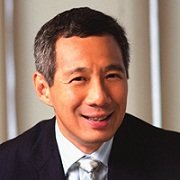Translated by Donaldson Tan

On 16 April 2011, Prime Minister Lee Hsien Loong hosted a mandarin TV forum “live”, engaging a panel of 12 Singaporeans from a cross-section of the population on a wide range of topics. The hour-long programme – Question Time with the Prime Minister – was shown “live” on Channel 8 from 8pm to 9pm. Topics for discussion include social, political and long term issues facing Singapore. There are 4 segments to the debate.
This is the 4th segment. Click here for: [Part 1] [Part 2] [Part 3][Part 4]
Moderator [Zeng Yeli]:
Now it is Li Lin’s turn to talk.
Zhang Li Lin [Political Observer, Institute of Policy Studies]:
I would like to talk about the integrity of candidates. I understand that MPs and Ministers are required to declare their income. For example, it is widely know that the Prime Minister allocates a proportion of his income to Feiyue Community Services. However, it is unclear how the PAP handles cases whereby friends and relatives of MPs or Ministers gain directorship, monetary gift or other payments in kind due to their affiliation to MPs or Ministers. Do MPs and Ministers declare this as well? How does the government ensure its integrity is corruption-free?
Lee Hsien Loong [Prime Minister]:
It is straightforward if we consider only MPs and Ministers. However the matter becomes grey when we extend our concern to family members, friends and other associates of the MPs and Ministers. The PAP depends on the honesty, trustworthiness of the individual MP or Minister to voluntarily declare benefits received by their affiliates. If the MP or Minister doesn’t declare and the PAP found out later (through investigation and verification of hearsay), and if the PAP decides this behaviour isn’t appropriate, then the PAP would know how to handle. This is a grey area which cannot be dealt along the lines of black and white. As long as his decisions as a MP or Minister were not swayed by bribery or other benefits, we are confident of his integrity.
Jiang Pei Sheng [Managing Director, Mr Bean]:
I would like to raise a question on the representative nature of NMPs and NCMPs. Should we make any amendments to boost their degree of representativeness in Parliament? For example, more avenues of expression or more speaking time?
Lee Hsien Loong [Prime Minister]:
Both NCMPs and NMPs have equal opportunity and speaking time with elected MPs. There is no difference.
Jiang Pei Sheng [Managing Director, Mr Bean]:
Can you increase the speaking time?
Lee Hsien Loong [Prime Minister]:
Increase more opportunity and speaking time for NMPs and NCMPs? I don’t think this would be fair. We should be fair.
Jiang Pei Sheng [Managing Director, Mr Bean]:
But they are a minority.
Lee Hsien Loong [Prime Minister]:
Minority? There is going to be 9 NMPs and at least 9 Opposition MPs (elected or made up from NCMP quota) in the next Parliament. The number of Opposition MPs at the next Parliament will be at least thrice the number of Opposition MPs today. It is not really a small figure.
Wang Di Cong [Radio Host, Capital 95.8 FM]:
An overseas friend commented to me once that Singapore is very strong, so I asked him what he meant by strong. He said that Singapore has a strong government and that is very good. However, I have a question on this. Is being too strong a government good? A strong government is big, efficient and effective, but will this (1) weaken the Opposition; (2) dwarf citizens; (3) cultivate an attitude of taking things for granted among citizens?
Lee Hsien Loong [Prime Minister]:
You [Wang Di Cong] are very articulate, but I only agree with Point (3). [LAUGHS]
Moderator [Zeng Yeli]:
Siu Wei, you are a young voter.
Du Siu Wei [Student, Nanyang Technological University]:
Yes, I am. I understand that the PAP put up young candidates to represent my generation of Singaporeans. This is reflected in the overall age profile of new candidates. However, I would like to know if younger candidates are sufficiently experienced to service and meet the demands of constituents across all ages.
Lee Hsien Loong [Prime Minister]:
The PAP hopes to put up a team that is representative of everyone. There would be young candidates, middle-aged candidates as well as elderly candidates. The team will work together and cooperate with each other to meet the needs of every constituent. Some candidates belong to minority races. Some candidates are very experienced. Some candidates are men while some are women. If they form a GRC team together, they can provide constituents with a more well-rounded service.
Moderator [Zeng Yeli]:
Let’s hear from a middle-aged voter.
Leng Chin Fai [Director, Feiyue Family Service Centre]:
In the PAP leadership renewal process, I don’t think former cabinet ministers should retire from politics. They should continue to be a MP, stay in Parliament to keep a check on public policies as they are familiar with the dynamics of government agencies, and the formulation & administrative phases of public policies. They are better positioned than anyone else to communiate the voices of the People effectively.
Lee Hsien Loong [Prime Minister]:
If the old Minister audits the new Minister, it would be very difficult for the new Minister to do his job. However, cooperation between the Prime Minister and former Prime Ministers is possible.
Yang Junwei [Media Freelancer]:
The PAP leadership is perceived as projecting only one type of voice. However, former and outgoing PAP leaders such as Tan Soo Khoon, Ong Teng Cheong and Lim Boon Yang only raised their objections to PAP policies after stepping down from leadership. Under what condition, will the public get to see more of such frank opinions?
Lee Hsien Loong [Prime Minister]:
I think your [Yang Junwei] impression is incorrect. These three persons also expressed their opinion and objections on government policies when they were holding leadership positions. When Ong Teng Cheong was President, there were differences between his interpretation of the Singapore Constitution and the Government’s, so we sough legal advice to resolve the differences. After stepping down as Speaker, Tan Soo Kheng continued to shake the House with his brutal honest and open speeches as a backbencher MP. However, Lim Boon Yang’s case is different. His outburst on the casino issue was the very same position he had when the the casino issue was first debated in Parliament in 2005. It is not true that they only speak their mind after stepping down.
Yang Junwei [Media Freelancer]:
How would voters voice out their opinions and disagreement when they see things such as ballooning of the 2010 Youth Olympics Games Budget and the construction of not one but two integrated resorts? The allocation of the Government Budget is also another area of concern.
Lee Hsien Loong [Prime Minister]:
Firstly, the government has a feedback unit whose job is to collect the views and disagreement. Secondly, Opposition MPs has the full right to speak in Parliament, and we encourage them do especially during Budget Debate. Unfortunately, the Opposition MPs didn’t make use of the opportunity to contribute to the policy debates, but they deliberately target lapses in government policies in order to score brownie points among the electorate. As much as I understand why they are doing this, it is also disappointing. As MPs, it is their role to discuss and debate public policy.
Zeng Su Wei [Student, Ngee Ann Polytechnic]:
The Singapore government is very keen on engaging young people. This can be seen in the outreach initiatives rolled out on Facebook. However, we feel it is meaningless as long as the government continues to do what it thinks is best with or without our feedback.
Lee Hsien Loong [Prime Minister]:
I hope young people like you [Zeng Su Wei] would step up and participate in the grassroot sector. There are many opportunities and we welcome young people. Our future is the collective journey of young Singaporeans, created together by all Singaporeans. Singaporeans must choose this coming General Election. What kind of future do they want? What kind of country do they want? What kind of government do they want to lead the country? Please think carefully and make the best decision.
Moderator [Zeng Yeli]:
Thank you, Prime Minister, for coming to the studio. I also would like to thank our panelists for engaging the Prime Minister. While we may not be able to raise all the questions sent to us, I hope this forum has helped you to make an informed decision this coming General Election.

